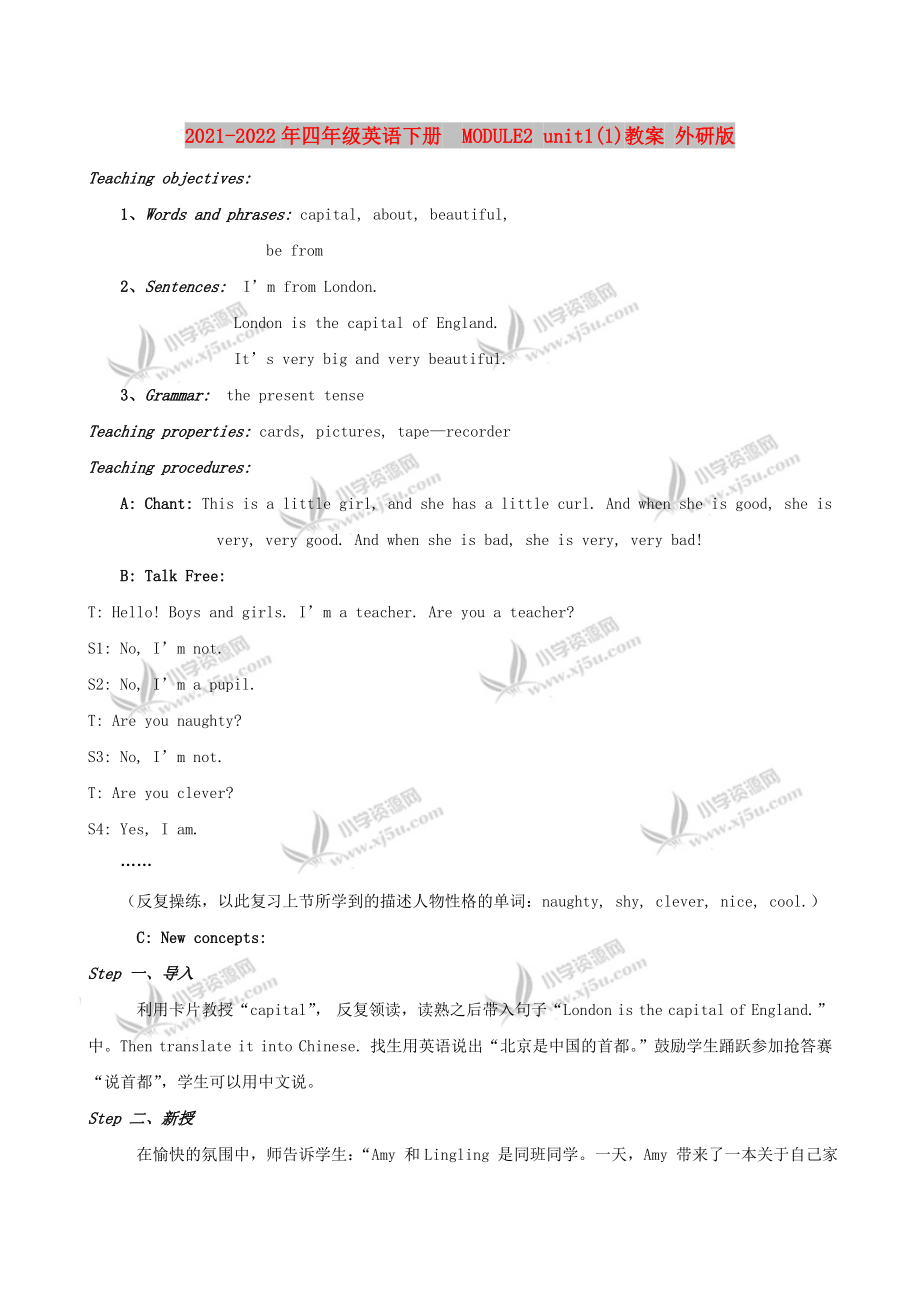《2021-2022年四年級(jí)英語(yǔ)下冊(cè)MODULE2 unit1(1)教案 外研版》由會(huì)員分享�,可在線閱讀��,更多相關(guān)《2021-2022年四年級(jí)英語(yǔ)下冊(cè)MODULE2 unit1(1)教案 外研版(3頁(yè)珍藏版)》請(qǐng)?jiān)谘b配圖網(wǎng)上搜索。
1�����、2021-2022年四年級(jí)英語(yǔ)下冊(cè) MODULE2 unit1(1)教案 外研版
Teaching objectives:
1���、Words and phrases: capital, about, beautiful,
be from
2�����、Sentences: I’m from London.
London is the capital of England.
It’s very big and very beautiful.
3�����、Grammar: the present tense
Teaching proper
2����、ties: cards, pictures, tape—recorder
Teaching procedures:
A: Chant: This is a little girl, and she has a little curl. And when she is good, she is very, very good. And when she is bad, she is very, very bad!
B: Talk Free:
T: Hello! Boys and girls. I’m a teacher. Are you a teacher?
S1: No, I’m
3���、not.
S2: No, I’m a pupil.
T: Are you naughty?
S3: No, I’m not.
T: Are you clever?
S4: Yes, I am.
……
(反復(fù)操練�����,以此復(fù)習(xí)上節(jié)所學(xué)到的描述人物性格的單詞:naughty, shy, clever, nice, cool.)
C: New concepts:
Step 一��、導(dǎo)入
利用卡片教授“capital”���, 反復(fù)領(lǐng)讀,讀熟之后帶入句子“London is the capital of England.”中��。Then translate it into Chinese. 找生用
4���、英語(yǔ)說(shuō)出“北京是中國(guó)的首都��?��!惫膭?lì)學(xué)生踴躍參加搶答賽“說(shuō)首都”,學(xué)生可以用中文說(shuō)���。
Step 二����、新授
在愉快的氛圍中��,師告訴學(xué)生:“Amy 和Lingling 是同班同學(xué)���。一天,Amy 帶來(lái)了一本關(guān)于自己家鄉(xiāng)—倫敦的書���。Lingling 看見(jiàn)這本書后非常好奇��,于是就請(qǐng)Amy 向她介紹倫敦的情況?�,F(xiàn)在我們就來(lái)跟 Amy 學(xué)一學(xué)怎樣描述城市和景物。 今天學(xué)習(xí)過(guò)后�,請(qǐng)大家也來(lái)介紹一下自己熟悉的城市�����、地區(qū)或景物。
請(qǐng)學(xué)生聽(tīng)錄音��,聽(tīng)一聽(tīng)Amy 和 Lingling 之間的對(duì)話�。師:“Where is London?” 生在地圖上指出倫敦的位置。
再放一遍錄音���,讓學(xué)生在自己的書上勾出描述城市的形
5���、容詞 (nice, big, beautiful, small)。
請(qǐng)學(xué)生根據(jù)插圖和上下文猜一猜每個(gè)生詞的意思��?����!癰eautiful”一詞教師要反復(fù)示范����,借助肢體語(yǔ)言幫助學(xué)生讀清并理解這一單詞��。個(gè)別單詞處理完之后����,教師領(lǐng)讀課文幾遍����。然后鼓勵(lì)學(xué)生分角色大膽試讀�����,教師及時(shí)給予表?yè)P(yáng)���。
Step 三��、練習(xí)
完成SB 第一單元活動(dòng)3��。 把全班分成兩人一組�,分別扮演 Amy 和 Lingling���,進(jìn)行問(wèn)答練習(xí)�����。
例如:1���、A: What’s this? B: It’s a book about London. It’s very nice.
2����、A: What’s the capital
6���、 of England? B: It’s London.
Step 四�����、作業(yè)
完成活動(dòng)用書練習(xí)1到練習(xí)4。
Module 2 London
Unit 1 London is the capital of England.
It’s a book about London.
London is the capital of England.
Designs:
附送:
2021-2022年四年級(jí)英語(yǔ)下冊(cè) MODULE2 unit1教案 外研版
本模塊由London si the capital of England和This is the River Th
7、ames.兩個(gè)單元組成�,介紹怎樣描述一座城市或一處景物���?本模塊向我們介紹了倫敦是英國(guó)的首都��、世界著名的大城市�����,是英國(guó)的金融、文化�����、藝術(shù)和教育中心��,泰晤士河穿越而過(guò)。倫敦歷史悠久���,名勝古跡眾多,擁有許多著名的建筑物和旅游景點(diǎn)��,其中包括倫敦橋��、倫敦塔��、塔橋�、大本鐘���、白金漢宮��、海德公園等。歌曲London Bridge is falling down.是一首傳統(tǒng)的英國(guó)歌曲��,讓我們感覺(jué)一下歌曲的旋律和內(nèi)容����,并邊唱邊做游戲。
Unit 1 London si the capital of England
Teaching aims: London si the capital
8���、of England.
And it's very big!
Teaching Importance and difficulties:How to describe?
Teaching tools:Recorder
Teaching steps:
step1: Warm up
1)Sing a song
2)Move round the classroom, pick up an object and say,"What 's this?" Point to another object and say ' What's that?"
9��、The students can respond,"It's a (n)...\ That's a (n)..."(Do many examples with the class.)
3)Have the students do the activity in pairs. Remind them that the word'this'is used for people or objects we are touching or close to .'That'is used for people or objects that some distance away.
Step
10�����、2: Learning and practising
1)Get the students to look aat the pictures and see if they can work out what is happening. Ask them question in Chinese .e.g:
What are the children looking at in the first picture?
What are the children doing in picture4?
What are they looking at i
11�、n the last picture?
2)Revise'big' and 'small',and pick up or point to objects in the classroom, say ,'This is \That is small' or 'This is \That is big.'(Do many examples with the class.)
3)Tell the students that you are giong to pick up or touch things and they have to say if they are big
12����、 or small.Remind the students that they will have to use 'that's' as they will be some distance away from the objects.(point to some of the things in the story and have individual students tell you if they are big or small.)
4)Point and say
revise the adjectives the students know, includ
13、ing colours,e.g. big small,naughty.clever,short,thin,fat, small,long, red,yellow.
Now point to objects on different pages in the book and say what each one is . The students have to make a statement about each object using an adjective.( Have the students continue the activity in pairs.)
Step3: Homework
 2021-2022年四年級(jí)英語(yǔ)下冊(cè)MODULE2 unit1(1)教案 外研版
2021-2022年四年級(jí)英語(yǔ)下冊(cè)MODULE2 unit1(1)教案 外研版

